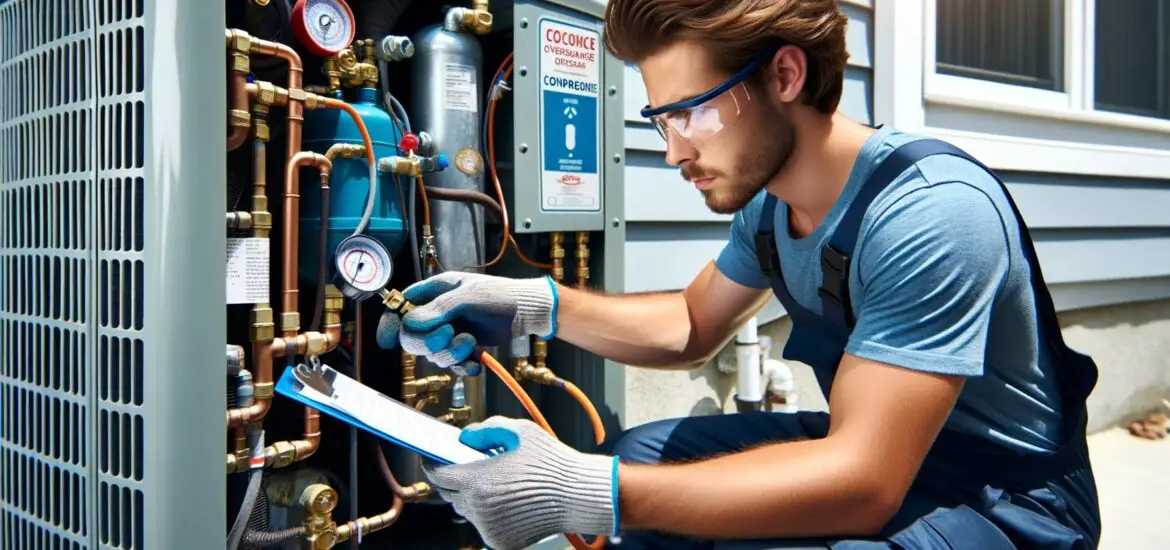If you’re worried that your air conditioner might have its freon overfilled, this comprehensive guide will walk you through everything you need to know about diagnosing and addressing this issue.

Table of Contents
Symptoms of Freon Overfilled in your AC
Recognizing the signs of freon overfilled in your AC is the first crucial step. Here are the symptoms you should look out for:
Poor Cooling Performance: One of the most noticeable signs of overfilled freon is a decline in the cooling efficiency of your AC. If your air conditioner is not cooling your space as effectively as it used to, it might be due to excessive freon.
Ice Formation: Excess freon can lead to lower temperatures in your AC’s evaporator coils than normal, causing moisture in the air to freeze on the coils. This ice buildup can further impede your AC’s performance.
High Energy Bills: An overfilled freon condition forces your AC to work harder, leading to increased energy consumption. If you notice a sudden spike in your energy bills without a corresponding increase in usage, it could be a sign of freon overfill.
Strange Noises: Unusual noises coming from your AC unit, like hissing or bubbling sounds, can also indicate an overfill. These sounds may result from the excess pressure of too much freon in the system.
What Does Too Much Freon Do?
Understanding the impact of freon overfilled is crucial for maintaining your AC. Here are the potential consequences of too much freon:
Damage to the Compressor: The compressor is designed to work with a specific amount of freon. When there’s too much, it creates excessive pressure and strain on the compressor, which can lead to its failure.
Reduced Efficiency: An optimal freon level is essential for the efficient operation of your AC. Overfill disrupts this balance, making your AC work harder to cool your space, thus reducing its overall efficiency.
Increased Wear and Tear: Consistently operating under conditions of freon overfill can accelerate the wear and tear on various components of the AC, leading to more frequent repairs and shortened lifespan of the unit.
Environmental Concerns: Freon, particularly older types, can be harmful to the environment. Proper management of freon levels is not just a matter of efficiency but also of environmental responsibility.
How to Address Freon Overfill
Addressing a situation where your AC has freon overfilled is crucial for its longevity and efficiency. Here are the detailed steps:
Turn Off the AC: As a safety measure, switch off your air conditioner immediately. This prevents the compressor from operating under stress due to the overfill.
Consult the Manual: Refer to your air conditioner’s manual. It usually contains specific information about the type and amount of freon your system requires, as well as safety precautions for handling refrigerants.
Seek Professional Help: Contact a licensed HVAC technician. They have the training, certification, and equipment to handle freon safely. Attempting to fix freon issues yourself can be dangerous and may violate local regulations.
Freon Removal: The technician will use specialized equipment such as a refrigerant recovery machine to carefully remove the excess freon from your system. This process requires precision to ensure that the freon level is brought back to the manufacturer’s specified level.
System Check: After adjusting the freon level, a comprehensive system check is vital. The technician should inspect the AC for any damages caused by the overfill and verify that the system is functioning correctly.
Maintenance Tips to Prevent Freon Overfill
Preventive maintenance is key to avoiding an overfill situation. Here’s what you can do:
Regular Check-Ups: Schedule annual or bi-annual maintenance checks with a professional. They will inspect your AC system, including freon levels, and perform any necessary adjustments or repairs.
Understand Your AC: Gain a basic understanding of your AC system, particularly regarding its refrigerant requirements. This knowledge can help you spot potential issues early on.
Quality Repairs: Always choose reputable and certified HVAC technicians for any repairs or maintenance work. This ensures that your AC is handled correctly and reduces the risk of freon-related issues.
When to Call a Professional
It’s crucial to recognize when professional assistance is needed. Handling freon requires specific expertise and tools. Here’s when you should call a professional:
Signs of Overfill: If you notice symptoms like poor cooling performance, ice formation, or unusually high energy bills, it’s time to consult a technician.
After Any DIY Attempt: If you’ve tried to fix your AC yourself and are still facing issues, don’t hesitate to call a professional. This can prevent further damage to your system.
Regular Maintenance: Even if your AC seems to be working fine, regular professional check-ups are important to maintain optimal performance and prevent issues like freon overfill.